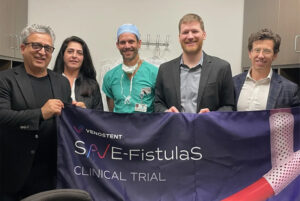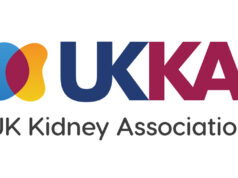 VenoStent has announced that the first subjects have been enrolled in the SAVE-FistulaS clinical trial, which will take place at two different sites across the USA; the Surgical Specialists of Charlotte. (Charlotte, USA), and the Cardiothoracic and Vascular Surgeons (Austin, USA).
VenoStent has announced that the first subjects have been enrolled in the SAVE-FistulaS clinical trial, which will take place at two different sites across the USA; the Surgical Specialists of Charlotte. (Charlotte, USA), and the Cardiothoracic and Vascular Surgeons (Austin, USA).
The US Food and Drug Administration (FDA) approved VenoStent’s SelfWrap bioabsorbable prevascular wrap (SelfWrap) to begin its US investigational device exemption (IDE) study in May 2023. The study will be a 200-subject, prospective, 1:1 randomised controlled trial (RCT) and will enrol subjects for both radiocephalic and brachiocephalic fistulas, with the idea that its technology can be applied to most arteriovenous fistulas (AVFS).
Chief executive officer and co-founder of VenoStent, Timothy Boire, explained that “this is the first ever [RCT] in the USA involving a medical device to improve outcomes from [AVF] creation surgery. While it’s ambitious and sets a high bar for FDA approval, we owe it to the chronic kidney disease (CKD) patient community to provide the highest level of clinical evidence. We’re confident, based on years of preclinical and clinical data, that we’ll demonstrate superiority to standard of care with this breakthrough technology.”
“I’m thrilled that the company has progressed to this stage. I applaud them for doing an RCT with level A clinical evidence in mind, as this will be essential to convince physicians of its utility if and when it attains FDA approval,” said Eric Peden, chief of vascular surgery at Houston Methodist Hospital (Houston, USA) and the national principal investigator (PI) of the SAVE-FistulaS clinical trial that has collaborated with VenoStent since 2018 on National Institute of Health (NIH)- and National Science Foundation (NSF)-funded studies.

“We’re proud to be the first site to enrol a patient in the study, as we believe that this technology can make a real difference in the lives of haemodialysis patients,” added Jason Burgess, PI at the Surgical Specialists of Charlotte.
“We’re using the body’s own healing mechanisms to our advantage by mimicking the arterial environment in veins,” explains VenoStent chief operating officer and co-founder, Geoffrey Lucks. “When a vein is connected to an artery, as in AVF creation, the vein experiences a tenfold increase in pressure and flow that is traumatising to veins. Many fail to become usable for dialysis. Our technology bridges that gap to help ‘arterialise’ the vein, and then is slowly resorbed and replaced by venous tissue. This is a complicated problem we aim to resolve with an elegant solution—mimic the arterial environment until you don’t have to anymore.”
Mark Barakat, VenoStent’s director of clinical affairs, added: “We’re working with superb collaborators in hospitals and research organisations across the USA, using the best science, and are tackling a true unmet clinical need. As a clinical trialist for more than two decades, usually you don’t get all of the above.”











